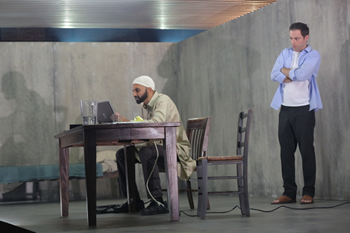HotReview.org Editor's
Picks
Shows Worth Seeing:

The Invisible Hand
By Ayad Akhtar
New York Theater Workshop
79 E. 4th St.
TICKETS
Hot on the heels of his Pulitzer-winning Disgraced, a sharply provocative work about a self-hating Pakistani-American apostate, Ayad Akhtar delivers another intellectually chewy, headline-driven play with sharply drawn characters whose conflict leaves the audience abuzz with rumination and reflection. The Invisible Hand doesn’t draw its provocative edge as much from action as Disgraced does. This is a play of ideas packaged as a hostage drama.
The title Invisible Hand refers to Adam Smith’s idea that the capitalist market is self-regulating. Capitalism only seems socially corrosive and selfish because we don’t see its big picture. In fact, everyone’s self-interest acts as a check for everyone else’s, which sometimes even allows the market to serve socially beneficial ends. This is really a claim of ethical neutrality, though it is sometimes touted as an ethic. It is spouted by Nick, the Citibank executive in the play who has been kidnapped by Islamic terrorists, along with a hundred other ideas about capitalism, in his efforts to save his life. Knowing that neither his government nor anyone else will pay his $10 million ransom, Nick convinces his captors to let him earn the money in the stock market. In the process he ends up educating his most brutal captor, Bashir, about international finance.
Ken Rus Schmoll’s production is first-rate. Brassy, ferret-eyed, coolly undistractable, Justin Kirk is so perfectly convincing as Nick he seems to have fallen straight out of a Princeton club onto the stage. Usman Ally is scarcely less realistic as Bashir: now angry and brutal, now curious and receptive, he’s the quintessential nightmare-protégé. Designer Riccardo Hernandez deserves a major shoutout for his set, which turns the improbable trick of making a nondescript, corrugated-metal prison feel extraordinarily dynamic.
All of that said, I have a quibble. The play’s drama of ideas, compelling and important as it is, doesn’t feel complete. The critique of capitalism is certainly explicit and precise: Bashir is corrupted by what Nick teaches him. He learns the recipe for the elixir that is sickening and enfeebling Western culture and his own culture, and he becomes an addict himself and thereby a more effective terrorist. Unfortunately, the play is far less clear about what opposes the capitalist system. Is it Islam? Religion in general? Non-Western culture? Marxism is barely mentioned. Apart from some practical talk about Nick’s captivity and some ambiguous claims to public beneficence by the imam Bashir works for, Akhtar sticks strictly to dialogue about business and markets. He gives his characters almost nothing to say about humanity, about what they think human life is for, and that is after all the deeper context for the subject of corruption.
Applied more generally to all Akhtar’s smart plays so far, this seems to me his major challenge now as a dramatist: raising the already stimulating debates in his work to the next, Shavian level.
